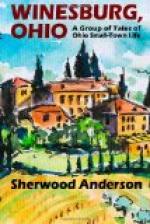Wing Biddlebaum talked much with his hands. The slender expressive fingers, forever active, forever striving to conceal themselves in his pockets or behind his back, came forth and became the piston rods of his machinery of expression.
The story of Wing Biddlebaum is a story of hands. Their restless activity, like unto the beating of the wings of an imprisoned bird, had given him his name. Some obscure poet of the town had thought of it. The hands alarmed their owner. He wanted to keep them hidden away and looked with amazement at the quiet inexpressive hands of other men who worked beside him in the fields, or passed, driving sleepy teams on country roads.
When he talked to George Willard, Wing Biddlebaum closed his fists and beat with them upon a table or on the walls of his house. The action made him more comfortable. If the desire to talk came to him when the two were walking in the fields, he sought out a stump or the top board of a fence and with his hands pounding busily talked with renewed ease.
The story of Wing Biddlebaum’s hands is worth a book in itself. Sympathetically set forth it would tap many strange, beautiful qualities in obscure men. It is a job for a poet. In Winesburg the hands had attracted attention merely because of their activity. With them Wing Biddlebaum had picked as high as a hundred and forty quarts of strawberries in a day. They became his distinguishing feature, the source of his fame. Also they made more grotesque an already grotesque and elusive individuality. Winesburg was proud of the hands of Wing Biddlebaum in the same spirit in which it was proud of Banker White’s new stone house and Wesley Moyer’s bay stallion, Tony Tip, that had won the two-fifteen trot at the fall races in Cleveland.
As for George Willard, he had many times wanted to ask about the hands. At times an almost overwhelming curiosity had taken hold of him. He felt that there must be a reason for their strange activity and their inclination to keep hidden away and only a growing respect for Wing Biddlebaum kept him from blurting out the questions that were often in his mind.
Once he had been on the point of asking. The two were walking in the fields on a summer afternoon and had stopped to sit upon a grassy bank. All afternoon Wing Biddlebaum had talked as one inspired. By a fence he had stopped and beating like a giant woodpecker upon the top board had shouted at George Willard, condemning his tendency to be too much influenced by the people about him, “You are destroying yourself,” he cried. “You have the inclination to be alone and to dream and you are afraid of dreams. You want to be like others in town here. You hear them talk and you try to imitate them.”
On the grassy bank Wing Biddlebaum had tried again to drive his point home. His voice became soft and reminiscent, and with a sigh of contentment he launched into a long rambling talk, speaking as one lost in a dream.




